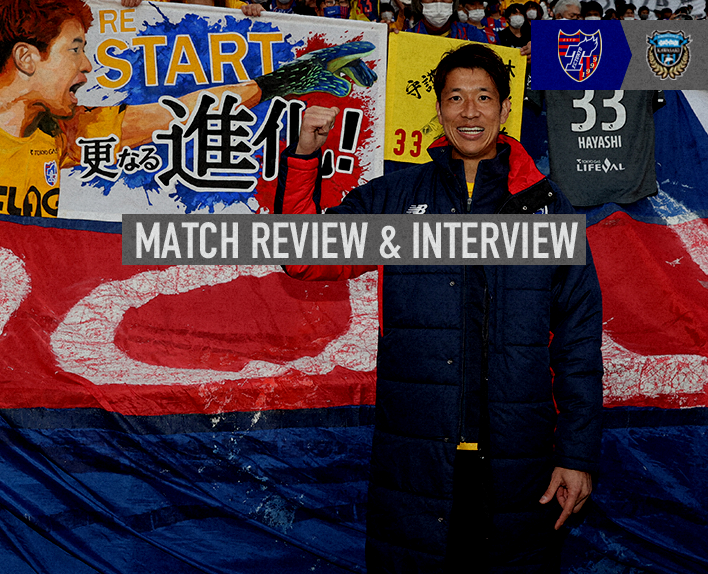<Match Preview>
We welcome the last game of the season, which is marked by transformation.
The current ranking after finishing 33 league matches is 6th. Compared to last season's 9th place, the performance has improved, but it can be said that this year has been one where growth has been more consciously recognized than the numbers suggest. Kuryu MATSUKI, who has participated in 30 matches so far, reflects on the team's changes throughout the season.
"Before the opening, we were in a situation where we couldn't move the ball from the back to the front. Now we are able to maintain possession while also executing quick vertical short counters."
"Love the ball" is the style of Albert PUIG ORTONEDA, and it has gradually and steadily taken root. There are still many challenges, but each player has begun to feel a sense of growth within the team.
This week's opponent is Kawasaki, with whom we have a good rivalry across the Tamagawa River. Having lost 0-1 in the opening match of this season, they are the perfect opponent to measure the team's growth. Although the opponent is in a situation where they are vying for the championship, Matsuki stated, "It has nothing to do with us," positioning this Tamagawa Classico as a match that will show what kind of football we will display from next season onward.
Towards the future, Tokyo will showcase the culmination of this season.
The matchday program is here
[Interview with Coach Albert PUIG ORTONEDA]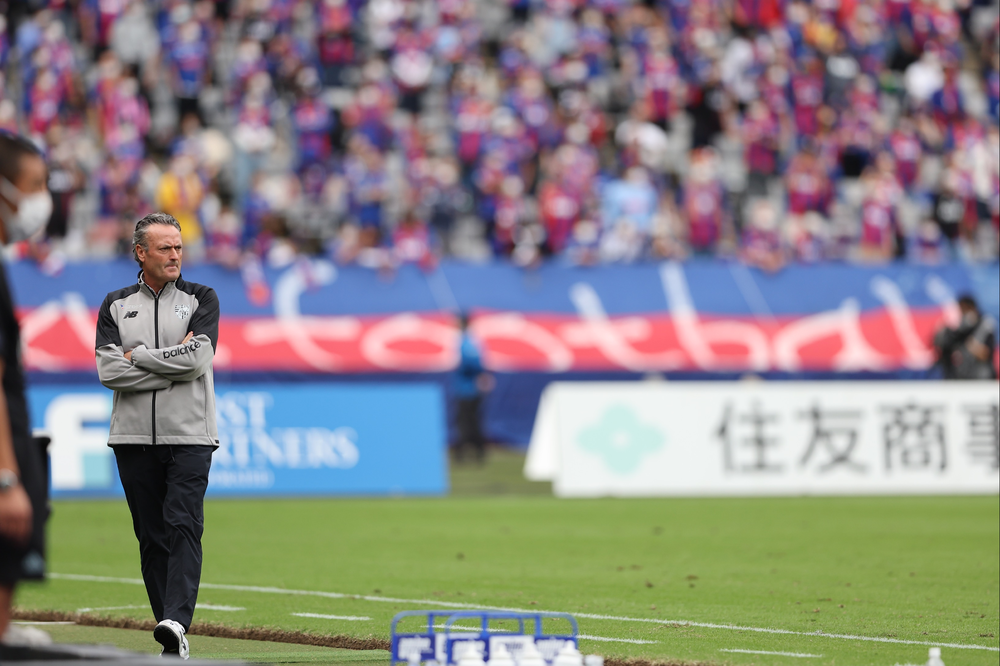
Q: Today is the last press conference of the year, thank you for this season.
I am the one who should be grateful. As the phrase goes, we travel together, and that includes all of you. It is important for us that you warmly welcome us. Your articles are a very important part of the club. In that sense, I would like to express my gratitude to all of you.
Q: I have seen the team building up day by day, but this year felt like it flew by. How was the coach?
A, it feels short now, but when I was there, it was indeed a long season. I think it was a difficult season for everyone, lasting three seasons due to COVID. At this moment, the reason it feels like time has passed quickly is that the players have been growing steadily. Because I could feel the players' growth every day, I felt joy and happiness from it, and ultimately, looking back, it feels like time has flown by.
Q: I believe tomorrow's match will be the culmination of the year.
As I mentioned the other day, when limited to a single match, the result can change due to various factors. That is why, for better or worse, we should not consider that one match as the summary of the entire season. I believe everyone has witnessed the team's gradual growth throughout this season. For example, in the recent match against Nagoya, the team was able to show signs of improvement, although we lost the game. However, even in defeat, people felt that the team was growing, and among Nagoya's fans and supporters, there were probably some who, despite winning, did not feel entirely satisfied. Also, to the Tokyo fans and supporters who came to cheer us on away from home, even though we lost, their warm support and singing after the match showed that they too witnessed the team's growth. That is why I would be happy if the team could once again demonstrate the progress made this season on the pitch in tomorrow's match, but even if that does not happen, there is no doubt that the team has grown.
Q: I think this season was a year of challenge for Tokyo. Looking back, what are your thoughts on it?
A, first of all, I think it has been a positive season. If we had won against Nagoya, it would have been a match to elevate us to 3rd place (against Kawasaki), so I believe we are in a decent position. However, I want to focus not on the results of the matches, but on the quality of the football. I would like to emphasize to everyone that the growth of the players in such a short period of time is certainly not an easy task.
Q: The other day, when I asked about the team's level of growth, you mentioned reaching 60%. Was that within your expectations?
First of all, when I say 100% completeness, I mean a winner's mentality, playing with the mindset that winning every match is the norm, and proving it both in performance and results. That is what 100% completeness means to me. With that image in mind, I started this season with the expectation and hope that the team could raise its completeness to about 40–60% by the end of the season, which would be satisfactory. And as a result, the players' contributions allowed us to reach the best level within that expectation, achieving 60% completeness. Now, for next season, if we can reach 80% completeness by the end of the season, I believe that would be worthy of success. Filling the remaining 20% from 60% to 80% will become even more difficult than before. The players joining the team will become important, and of course, including the current players, it is crucial that we continue to demand a lot from them in every training session next season as we did this season. When they clear those challenges, we will give them even more difficult tasks, creating an environment where players have no choice but to grow. This season started from zero at the beginning of preseason. Next season, we can start with 60% completeness, so the starting point is completely different. Part of that 20% growth includes new players quickly adapting well to the team and expressing their talents within the team. I want to work hard every day with the hope that by the end of next season, we will have reached 80%. We can talk next year about how to fill the gap from 80% to 100%. One thing we must not forget to raise the team's completeness is to keep fighting with a focus on winning. That is an essential part. The closer the completeness gets from 80% to 100%, the more naturally the team will be able to focus on winning and express that on the pitch. If we can do that, I believe we can break into the top ranks.
Q: I think both teams have changed since the opening match, what do you think?
A, I believe that tomorrow's match could go either way. What I envision for tomorrow is that as we approach the final match of the season, our team is already prepared to step onto the pitch without fear against teams like Kawasaki or Yokohama F.Marinos. Of course, there is a possibility that we could lose tomorrow. However, I am confident that the players will step onto the pitch knowing they can compete on equal terms with them. On the other hand, at the beginning of the season, hearing the names of opposing teams made us a bit hesitant, but I think the big difference is that tomorrow, even against Kawasaki, we will not feel that way. That is the foundation we have established.
[Player Interview]
<Masato MORISHIGE>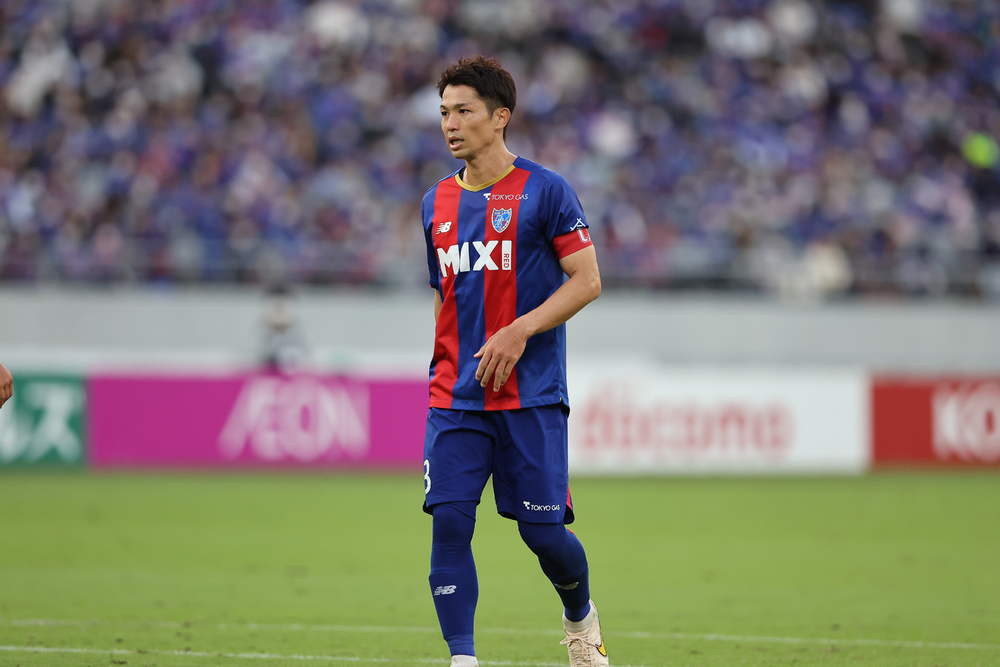
Q: The final match of the season is approaching. How do you feel about the team's growth over the past year?
A,I feel that by positively embracing the challenge of new football and continuing to work at it, we are starting to see a direction, and as we approach the end, the players seem to be gaining confidence to play in matches little by little. There are still challenges, but I feel that a good cycle is being created as the players actively work to solve these challenges.
Q: Looking back on the season, there were times when results were hard to come by. As captain, what mindset did you have when facing the team?
A,I understood that it would take time to see results, so even when things weren't going well, I made a conscious effort to stay focused on the direction we are aiming for and to engage in soccer. I feel that we are gradually getting closer to our ideal group. We are able to train together in a fun yet rigorous manner while discussing soccer. I believe that the attitudes of players like Yuto NAGATOMO and Keigo HIGASHI have a significant positive influence on the younger players.
Q: This season, there have been many instances where players discuss among themselves after practice.
A、The soccer that Tokyo is working on, which is about "loving the ball," offers so many options for play that it never ceases to be a dilemma. Many issues cannot be resolved without discussion among the players, but perhaps it is precisely because that process is enjoyable that they can engage in soccer proactively.
Q: What kind of team do you want to build in Tokyo for next season?
A,I believe that exciting and enjoyable football is ideal. To achieve that, we need to aim for a more attacking style of play that can score more goals. I think this season has required a lot of patience from our fans and supporters, but I believe that next season will be a year where you can enjoy it even more. In this match, I will do my best to make it a game that connects to next season, so that everyone can look forward to it.
<Kuryu MATSUKI>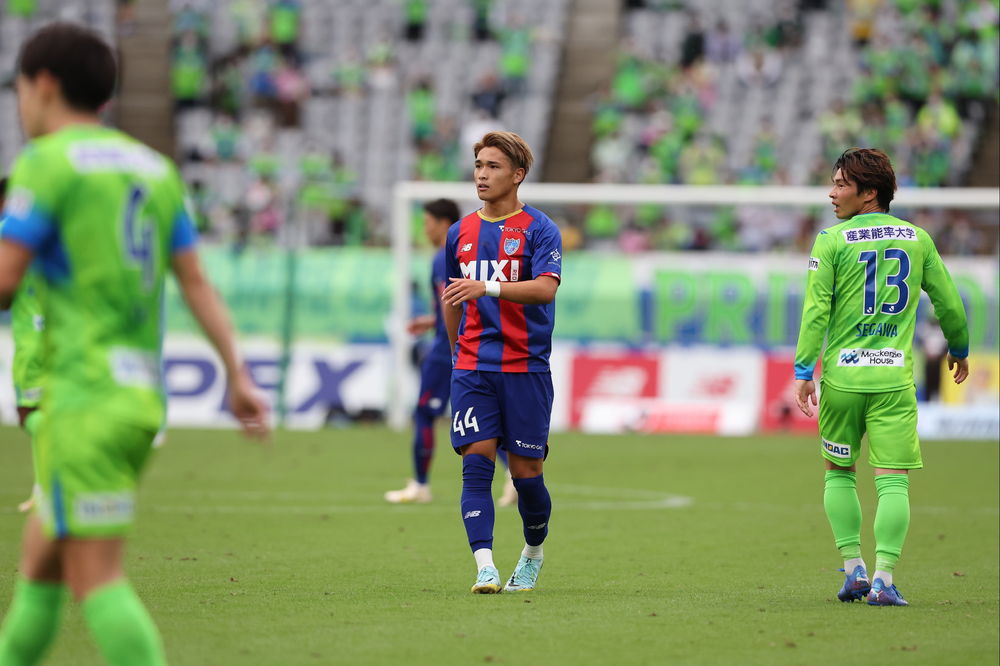
Q, After winning the high school soccer championship, your next opponent was the team that won the J-League the previous year. What was your impression before facing them?
A, I think this is a team that can definitely be called the absolute champion in recent years, and although the members have changed somewhat, I thought it was a very good team while watching the matches.
Q: You made your professional debut and started in the lineup for the first time. What instructions did you receive from Coach Albert PUIG ORTONEDA?
A, it was my first time playing soccer on a professional stage, and the coach encouraged me to play calmly. Diego TABA also spoke to me, creating an environment where I could easily blend into the pitch.
Q: How did you feel when you were selected to be in the starting lineup?
A, I thought it would be fun.
Q: You actually stood on the pitch and faced players like Leandro DAMIAO and Akihiro IENAGA, who are at a level not seen in high school soccer. How did you feel about that? Are there any players that left a strong impression on you?
I felt that everyone, including A, Kaneko, and Leandro DAMIAO, had a high level of skill. I just turned professional from high school, and the pace of the game was completely different, so at first, I couldn't visualize it. However, as I got used to it, I think I was able to play in a way that didn't lose to those players. Leandro DAMIAO's winning goal made me realize what being a professional is all about.
Q: In that game, you made a strong impact with a powerful mid-range shot that was unfortunately saved by the opposing goalkeeper. We are now at the end of the season, but if Matsuki were to play in that match again, would anything change in what you could do?
A. I think what I do in soccer now is different from what I did in the previous match. Since I have been continuously playing in matches and gaining experience, I believe there are more things I can do now than at the time of the opening match.
Q: What are the differences between soccer in the past and soccer today?
A, I believe that applying pressure from the front has not changed since the opening match, but the way we build up has changed.
Q: After spending a year as a professional, has your way of thinking changed? Also, please tell us the points where you have grown.
Since Coach Albert PUIG ORTONEDA became the coach, I have learned the importance of "loving the ball," and that has contributed to my own growth.In terms of playing style, progressing towards the goal while maintaining possession is an area where I have grown.
Q: Tokyo has not won against Tamagawa Classico since the 2018 season when Matsuki was in middle school, do you feel any special atmosphere?
A, I didn't feel that kind of atmosphere during the opening match. I don't feel it's a classic match, but I am determined to win the game in front of me. However, considering that we haven't been able to win, the desire to win in the final match arises.
Q. What do you think about Coach Albert PUIG ORTONEDA's style of football?
It is a style of football that aims for the goal while maintaining possession of the ball, and I believe that each player is required to adapt their play. While connecting the ball, if there is space ahead, we can also attack with a sharp counter, making it a team that is strong in adaptability.
Q: Please share your enthusiasm.
Being able to play the final match at home is a significant thing for us, and we want to end the match well to carry that into next season.
<Koki TSUKAGAWA>
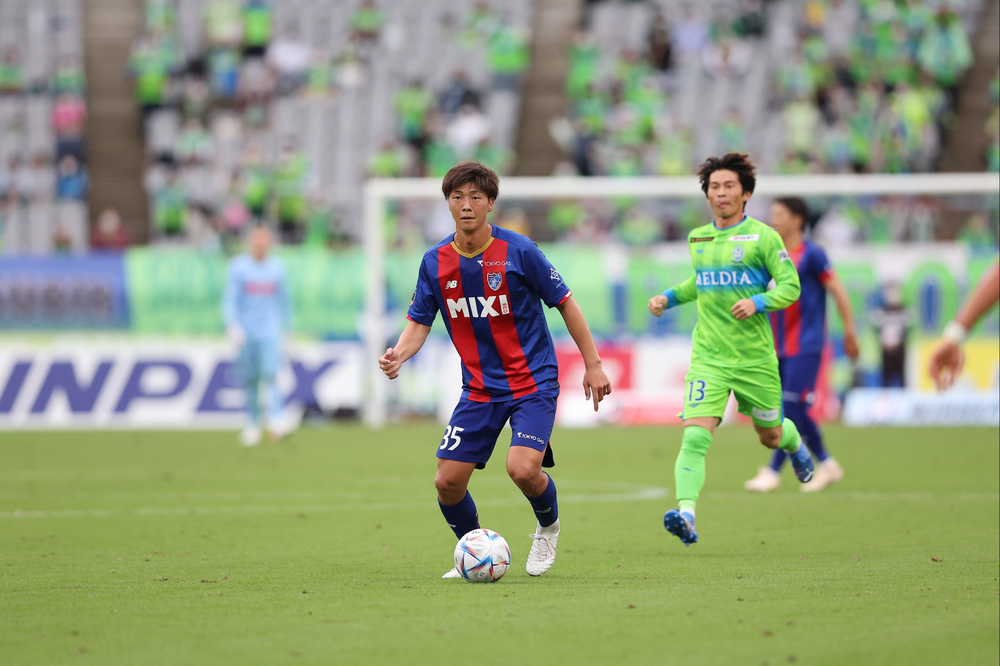
Q: At the time of the opening match, Tsukakawa was a player for Kawasaki Frontale. What was the atmosphere like for the opening match for a team that has won back-to-back championships?
We had won back-to-back championships, but I thought of it as a fresh start. For Kawasaki Frontale, the first match is a crucial battle to see if we can gain momentum or not, and no one was thinking about the back-to-back championships; I believe everyone was fully committed to fighting as it was the first match of this season.
Q: The opponent Tokyo has just changed their head coach. How were they scouted and what measures were taken?
It is the historic Tamagawa Classico, and everyone felt that it was not just a single match. We understood that winning or losing this battle would relate to the team's motivation moving forward. I believe that it will take a lot of time to aim for new strategies against Tokyo, and I thought there would be some openings to exploit. From the start of the match, I think we were considering applying pressure from the front to seize control.
Q: You entered the pitch in the 63rd minute as a substitute for Chanathip. What was the specific mission assigned to Tsukagawa? What were you feeling while playing?
A, as it was the first match, whether we win or lose is related to gaining momentum, so I prepared to win for the team and entered the match with the mindset to win. Since the situation was 0-0, the message to go for the win was conveyed. Ultimately, we were able to win 1-0, so I accomplished the task given by the coach, but personally, I remember it being a frustrating match with remaining challenges.
Q: Are there any players from FC Tokyo that you were particularly cautious about?
A, Diego TABA is a player who can control the ball and has a sense of scoring in front of the goal, so I was personally cautious about the possibility of him scoring there.
Q, is there anything regarding Matsuki?
A, after graduating from high school, I remember thinking, "Is he really a high school student?" as he confidently played against Kawasaki in the opening match.
Q: What do you think is the strength of Kawasaki?
I think there are many elements, but I believe it is about always thinking about soccer. There are many stoic players, and I think the fact that Kawasaki has achieved the rare feat of consecutive championships is related to not getting overly excited or disappointed. What surprised me was that the only time they celebrate is right after the match in the locker room, and by the time they leave the stadium, they have already switched their mindset. In the teams I have been with before, joy often carried over to the next match, but Kawasaki has a switch after winning, and I believe that winning was taken for granted in that team. I think that mentality was incredible.
Q: As a player for FC Tokyo, you will be facing your former club. Which players are you wary of from your position, and what kind of plays do you want to focus on? Also, what are your thoughts on this situation?
I think the player to watch out for is Akihiro IENAGA. He can create the game on his own and change the flow. However, if we can contain IENAGA, it will make it difficult for Kawasaki to play their style of football. If we give him too much freedom, I believe it will turn into Kawasaki's rhythm, and while I'm not sure if our positions will overlap, I want to be conscious of stopping IENAGA to prevent the opponent's flow.
Q: How do you feel about transferring mid-season and facing Kawasaki?
A, I am honestly very excited. It was a team that took great care of me, and all the players are wonderful people. Although it was a tough time for me, I have many more good memories. I am really looking forward to fighting on the pitch with the teammates who supported me.
Q: What do you think about Coach Albert PUIG ORTONEDA's style of football? It is said to be a "connecting football," but how does it differ from Coach Oniki's style?
I think the difference is not so much between Coach Albert PUIG ORTONEDA and Coach Oniki, but rather the types of players available and who will be on the field. Playing a connecting style of football requires good ball handling and awareness of the surroundings. Within that, I believe there is a team identity, and Kawasaki has players like Enomoto who create time for the team to possess the ball. Tokyo, while having those aspects, has stronger individual players in the forward line, so I want to effectively utilize those strengths.
Q: Please share your enthusiasm.
A, I knew that the final match would be against Kawasaki Frontale at the time of my transfer. If I don't earn my position, I won't be able to participate in this match, and I want to fight on this pitch with the teammates who have battled alongside me for a year and a half. I have worked hard to earn the right to stand on this pitch, so I want to be firmly on the pitch in the final match and win.
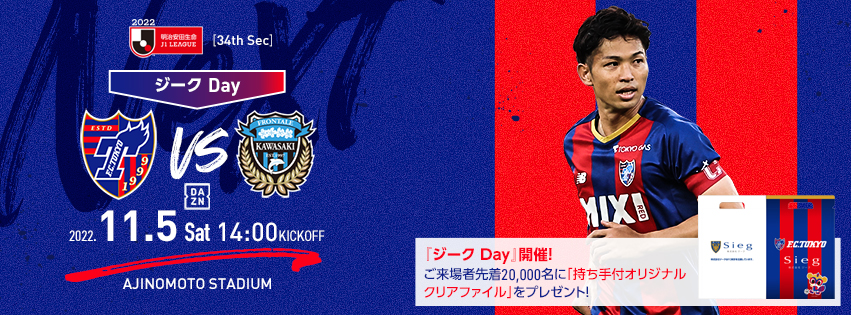
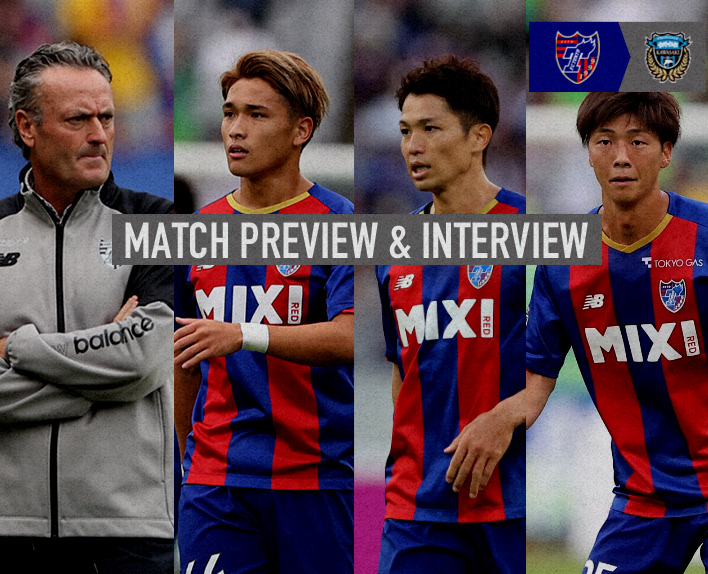



![[2022 Season Review] Albert PUIG ORTONEDA Interview](/en/upload/Tokyoism/images/img_316_63636ccb-0718-46bf-87a7-668f0a000292.jpg)
